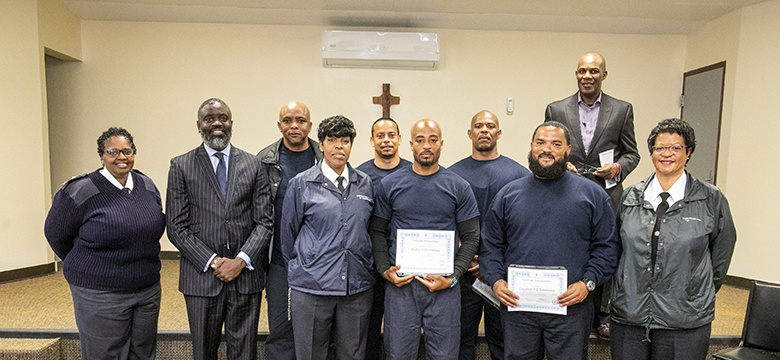
On Friday (29 March), the Department of Corrections celebrated five participants from the Violence Reduction Programme (VRP) with a graduation ceremony held at the Co-Ed Facility.
In attendance was the Minister of National Security, the Hon. Wayne Caines, JP, MP, Department of Corrections senior officials, and family members.
This was the second VRP held by the Department of Corrections and the first completed in the east end correctional facilities. The programme was managed by, Lead Facilitator and Psychologist, Dr. Emcee Chekwas, Principal Officer, A. Ming, and Divisional Officer, D. Caisey.
The successful graduates of the program were:
- Daymon Simmons
- Phillip Bradshaw
- Tio Weeks
- Shannon Tucker
- Robert Damon Green
At the graduation, Minister Caines spoke of the need for the men to be proud of their accomplishments. He also informed them of the opportunity they now have to educate their peers, become role models and examples to men in similar circumstances, of what is possible.
Minister Caines said, “After hearing the men speak of their experience going through the program and how it has affected them, I have no doubt that the learning experience has made a profound impact on their lives.”
“Furthermore, it is my belief that when these men are released from custody, the Violence Reduction Program will have provided them the tools needed to break the cycle of violent behavior and become productive members of society."
Those in attendance at the graduation were treated to a inspirational spoken word performance by Right Living House resident, Stephen O’Neil.
Background:
The Violence Reduction The Violence Reduction Programme (VRP) provides rehabilitative group therapy intervention for inmates at Bermuda Correctional Facilities. The four to six month programme is based upon cognitive-behavioural and social learning principles. It seeks to rehabilitate violent offenders through a cognitive therapeutic and clinical process. Participants learn to reduce tendencies towards violent acts and address the underlining factors that cause it. The overall aim of VRP is to reduce the likelihood and seriousness of violent and aggressive behaviour occurring or reoccurring in offenders by developing each participant’s understanding of their own pathways to violent behaviours.
